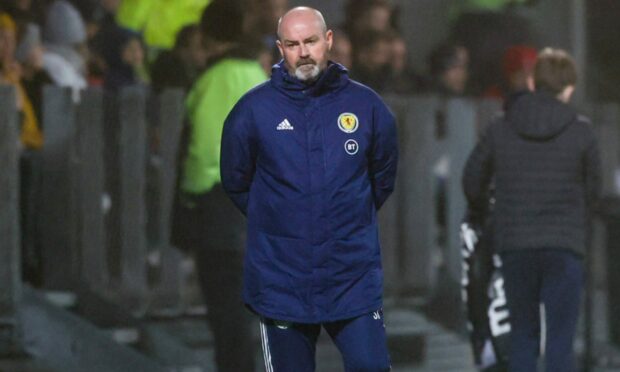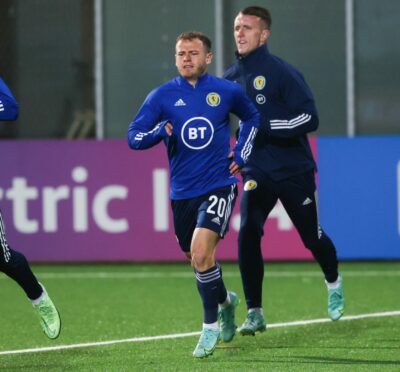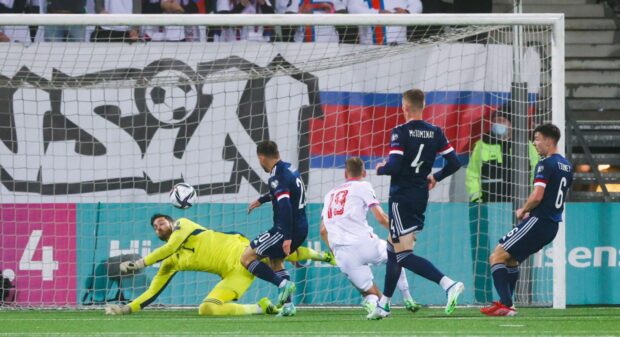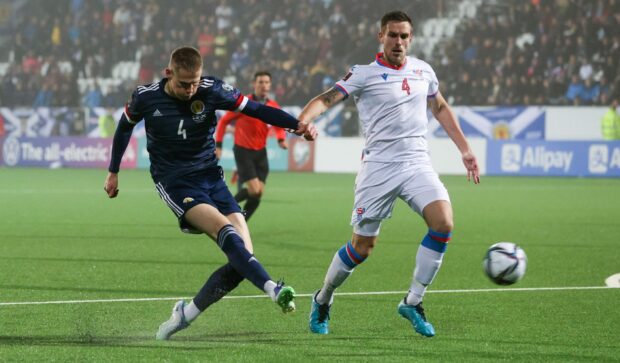Make no mistake about it, Scotland should not get an easy ride for their display despite managing to defeat the Faroe Islands.
Laboured, uninspiring, lacking in potency, it was everything that the Israel performance was not.
They huffed and puffed for large parts of the game in Torshavn and had the home side been more clinical, could have been on the receiving end of something embarrassing.
Lyndon Dykes’ winner was scruffy and came with a good element of fortune. A 1-0 win away to the Faroes strengthens Scotland’s position for a World Cup play-off place but stirred little positive emotions.
The changes Steve Clarke made were less than perhaps was expected. Ché Adams’ injury meant there was a vacancy up top, which Ryan Christie filled. Grant Hanley’s return from suspension saw him back in defence and Scott McTominay moved back into midfield.
The third was Fraser’s inclusion as an attack-minded wing-back, coming in at the expense of Nathan Patterson.
It is a role the former Aberdeen man has taken up before. Fraser played on the right side and scored in the reverse fixture in March, where Scotland emerged 4-0 winners.
Expectedly Fraser played higher up the field in a more natural winger-like role. Christie tucked inside to be a closer ally to Lyndon Dykes and allow Fraser the channel to run into.
The problem, particularly in the first half, was Scotland failed to utilise the advantage they had in the wide areas often enough.
Andy Robertson had one foray forward that was nullified quickly by Faroes goalkeeper Teitur Gestsson, while a promising one-two between Fraser and Christie saw the return ball too heavy for the Newcastle winger.
With Scotland having such strong players in central areas, it can be tempting to congest the play through the middle. Christie and John McGinn will want to play between the width of the penalty area, so Robertson and Kieran Tierney have to work so effectively as a pair to make Scotland a threat down the left.
Fraser often found himself in good positions, even against the Faroes’ 5-4-1 formation, but was not picked out. Scotland were instead restricted to half-chances as the underdog hosts created the better opportunities.
Gilli Rolantsson and Hallur Hansson – both of whom spent time at Aberdeen as teenagers – were lively opponents and were part of a Faroes team who moved the ball much quicker than Scotland.
Clarke had warned in the build-up to the game about underestimating the Faroes but perhaps Scotland had not read the script.
It was surprising the Scotland manager left it until after the hour to change anything, given the game was drifting along and drastically needed an injection of something different.
An extra forward, a change of system; something to indicate they had different ideas as to how to break this Faroes side down. They did shift the ball wider with greater frequency and presented Robertson and Fraser with more crossing opportunities, but they were yielding little.
The first change that was made was for Callum McGregor to come on, which did not result in any significant change in setup for Scotland. McTominay shuffled back into defence and it was as you were.
Shots were coming, with McTominay, Billy Gilmour and Tierney all trying for goal, but none were threatening Gestsson, who must have been pinching himself at the quiet night he had.
His one bit of business came with 11 minutes to go as McGinn met Fraser’s cross with a header, which he comfortably dealt with.
When Scotland finally broke the deadlock it came with a huge amount of fortune, deflecting off a Faroese defender on to Dykes’ chest and going in. For the second time in four days, the big striker benefitted from a VAR call, as they took an extended look at a potential handball against Dykes.
While the result is ultimately all that matters – three points was vital after the Israel game – the performance was far from acceptable. Clarke has to address that before the final double-header in November.



